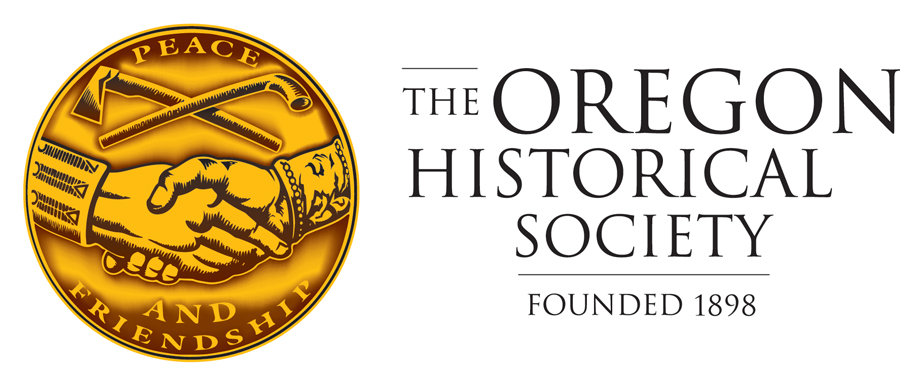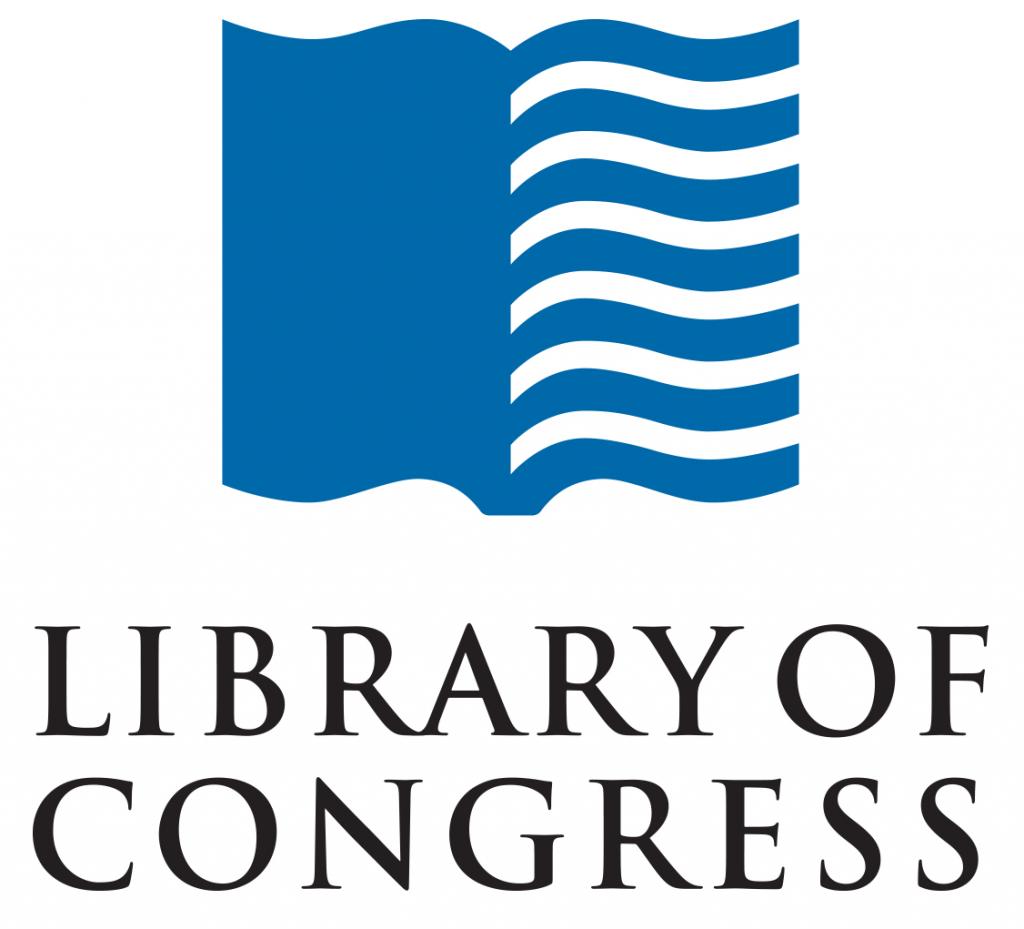from
Drum played at the funeral of Abraham Lincoln
-
Full Title
Drum played at the funeral of Abraham Lincoln
-
Description
Drum played at the funeral of Abraham Lincoln by W. H. Brooks, a resident of Portland, OR and Hillsboro, OR after 1908. Brooks enlisted in the Union army in 1861 when he was 14 years old and served in the 14th Iowa Regiment in a brigade the Confederates dubbed the "Hornets' Nest" because it so fiercely defended its position in a sunken road at Shiloh, Tennessee. In 1931, Brooks told an Oregonian reporter he had marched more than 800 miles before his discharge from the army. He recounted, "I was in the consolidated drum corps that played in the funeral procession of President Lincoln from the city to Oak Ridge cemetery in May 1865. I saw the president's casket placed in the vault."
-
Source
Oregon Historical Society
-
Rights
Use of this item for research, teaching, and private study is permitted with proper citation and attribution. Reproduction of this item for publication, broadcast, or commercial use requires written permission.
-
Tags
-
Cite this Item
William Henry Brooks, 14th Iowa Regiment. "Drum played at the funeral of Abraham Lincoln". Remembering Lincoln. Web. Accessed May 15, 2025. https://rememberinglincoln.fords.org/node/1041
from
Drum played at the funeral of Abraham Lincoln
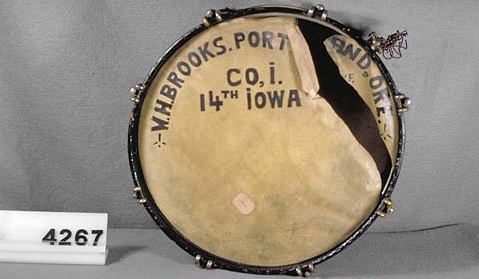
-
Description
Drum played at the funeral of Abraham Lincoln by W. H. Brooks, a resident of Portland, OR and Hillsboro, OR after 1908. Brooks enlisted in the Union army in 1861 when he was 14 years old and served in the 14th Iowa Regiment in a brigade the Confederates dubbed the "Hornets' Nest" because it so fiercely defended its position in a sunken road at Shiloh, Tennessee. In 1931, Brooks told an Oregonian reporter he had marched more than 800 miles before his discharge from the army. He recounted, "I was in the consolidated drum corps that played in the funeral procession of President Lincoln from the city to Oak Ridge cemetery in May 1865. I saw the president's casket placed in the vault."
-
Source
Oregon Historical Society
-
Rights
Use of this item for research, teaching, and private study is permitted with proper citation and attribution. Reproduction of this item for publication, broadcast, or commercial use requires written permission.
-
Creator
William Henry Brooks, 14th Iowa Regiment
-
Dimensions
diameter 16"; depth 9"
from Apr. 14, 1865
Silas H. Billings Diary
-
Full Title
Silas H. Billings Diary
-
Description
Silas H. Billings was a U.S. Army soldier from Lafayette, New York, wounded at the Battle of Winchester in September 1864. In April 1865 he was a patient at Saterlee Hospital in Philadelphia, Pennsylvania, when he learned that John Wilkes Booth had assassinated President Abraham Lincoln. Billings then received permission to attend Lincoln's funeral in Philadelphia. Like many people at the time, Billings recorded both newsworthy events, like Lincoln's assassination, and the details of his everyday life together. After the Civil War, Billings became a school teacher and part-time farmhand. His wounds led to his death in 1873, at the age of only 30.
-
Transcription
[inside cover]
Silas H. Billings
Wounded at
Winchester Va
Sept 19 1864
[Friday, April 14, 1865]
Abraham Lincoln
is Shot at Fords
Theatre at 9,30 p m and dies at 722 am
Wm H & Fred Seward are stabbed at or
about the same time
[Saturday, April 15, 1865]
my eye is very bad
[Wednesday, April 19, 1865]
Funeral of our Chief
Abraham Lincoln
President of the
U S of America
Recd a Visit from
C F Falch co. "D" 9 ny
Ward 2 Turners Lane
[Saturday, April, 22, 1865]
Recd a pass 2 pm to 9 pm
went downtown to Corner
of Broad & Prime Sts
Funeral Train of the
late President A Lincoln
arrives at 4,30 pm
Procession is formed in
Broad & goes down to
Walnut up to 21st
down to Vine down to
2nd up to Chesnut to
Independence Hall on
Chesnut between 5th & 6th
-
Source
Marjorie Billings Martinez, great-granddaughter of Silas H. Billings
-
Rights
This item may be reproduced and used for any purpose, including research, teaching, private study, publication, broadcast or commercial use, with proper citation and attribution.
-
Tags
-
Cite this Item
Silas H. Billings. "Silas H. Billings Diary". Remembering Lincoln. Web. Accessed May 15, 2025. https://rememberinglincoln.fords.org/node/1040
-
Creator
Silas H. Billings
-
Date
April 14, 1865
from Apr. 14, 1865
Silas H. Billings Diary
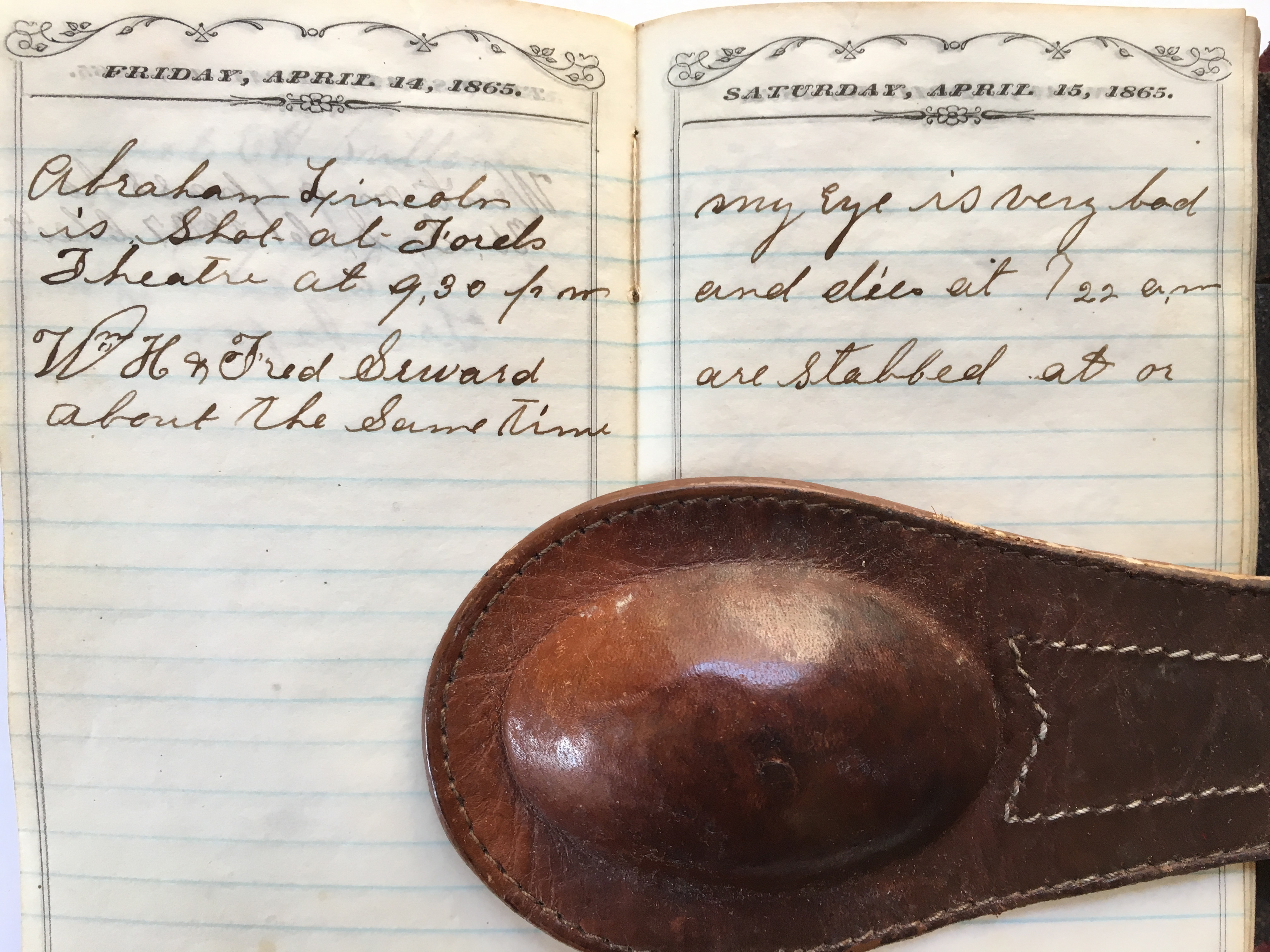
-
Description
Silas H. Billings was a U.S. Army soldier from Lafayette, New York, wounded at the Battle of Winchester in September 1864. In April 1865 he was a patient at Saterlee Hospital in Philadelphia, Pennsylvania, when he learned that John Wilkes Booth had assassinated President Abraham Lincoln. Billings then received permission to attend Lincoln's funeral in Philadelphia. Like many people at the time, Billings recorded both newsworthy events, like Lincoln's assassination, and the details of his everyday life together. After the Civil War, Billings became a school teacher and part-time farmhand. His wounds led to his death in 1873, at the age of only 30.
-
Source
Marjorie Billings Martinez, great-granddaughter of Silas H. Billings
-
Rights
This item may be reproduced and used for any purpose, including research, teaching, private study, publication, broadcast or commercial use, with proper citation and attribution.
-
Creator
Silas H. Billings
-
Date
April 14, 1865
from May. 1, 1865
Requiem march in honor of President Lincoln
-
Full Title
Requiem march in honor of President Lincoln
-
Description
This is sheet music for President Lincoln's funeral march for solo piano. The title on the cover page is "Requiem March In honor of President Lincoln," while the first page of music lists the title as "President Lincoln's funeral march." A requiem is traditionally in a minor key and imitates the solemn, slow pace of a funeral procession. This piece is part of the Library of Congress Civil War Sheet Music Collection, associated with the Union side. Probably a third of the entire U.S. population at the time, out of a total of 31 million, participated in some kind of memorial commemoration for Lincoln. Roughly 150,000 people were present at Lincoln's funeral in Springfield.
-
Source
-
Rights
Public Domain. Suggested credit line: Civil War Sheet Music Collection, Library of Congress, Music Division.
-
Tags
-
Cite this Item
Fiske, W. O.. "Requiem march in honor of President Lincoln". Boston: Oliver Ditson & Co., 1865. Remembering Lincoln. Web. Accessed May 15, 2025. https://rememberinglincoln.fords.org/node/1033
from May. 1, 1865
Requiem march in honor of President Lincoln

-
Description
This is sheet music for President Lincoln's funeral march for solo piano. The title on the cover page is "Requiem March In honor of President Lincoln," while the first page of music lists the title as "President Lincoln's funeral march." A requiem is traditionally in a minor key and imitates the solemn, slow pace of a funeral procession. This piece is part of the Library of Congress Civil War Sheet Music Collection, associated with the Union side. Probably a third of the entire U.S. population at the time, out of a total of 31 million, participated in some kind of memorial commemoration for Lincoln. Roughly 150,000 people were present at Lincoln's funeral in Springfield.
-
Source
-
Rights
Public Domain. Suggested credit line: Civil War Sheet Music Collection, Library of Congress, Music Division.
-
Creator
Fiske, W. O.
-
Publisher
Boston: Oliver Ditson & Co., 1865
-
Date
May 1, 1865
-
Material
Sheet Music
from May. 1, 1865
Lincoln's funeral march
-
Full Title
Lincoln's funeral march: as played by Menter's Band
-
Description
Funeral march for solo piano. The composer dedicated this work "to the nation" and it was composed "in commemoration of Abraham Lincoln, President of the United States, The Savior of His Country." Part of the Library of Congress Civil War Sheet Music Collection, associated with the Union side.
-
Source
-
Rights
Public Domain. Suggested credit line: Civil War Sheet Music Collection, Library of Congress, Music Division.
-
Tags
-
Cite this Item
Hess, Charles. "Lincoln's funeral march: as played by Menter's Band". Cincinnati: A. C. Peters & Bro., 1865. Remembering Lincoln. Web. Accessed May 15, 2025. https://rememberinglincoln.fords.org/node/1032
from May. 1, 1865
Lincoln's funeral march: as played by Menter's Band

-
Description
Funeral march for solo piano. The composer dedicated this work "to the nation" and it was composed "in commemoration of Abraham Lincoln, President of the United States, The Savior of His Country." Part of the Library of Congress Civil War Sheet Music Collection, associated with the Union side.
-
Source
-
Rights
Public Domain. Suggested credit line: Civil War Sheet Music Collection, Library of Congress, Music Division.
-
Creator
Hess, Charles
-
Publisher
Cincinnati: A. C. Peters & Bro., 1865
-
Date
May 1, 1865
-
Material
Sheet Music
from May. 1, 1865
President Lincoln's funeral march
-
Full Title
President Lincoln's funeral march
-
Description
Funeral march for solo piano "respectfully dedicated to the people of the United States." Part of the Library of Congress Civil War Sheet Music Collection, associated with the Union Side.
-
Source
-
Rights
Public Domain. Suggested credit line: Civil War Sheet Music Collection, Library of Congress, Music Division.
-
Tags
-
Cite this Item
Mack, E.. "President Lincoln's funeral march". Philadelphia: Lee & Walker, 1865. Remembering Lincoln. Web. Accessed May 15, 2025. https://rememberinglincoln.fords.org/node/1031
from May. 1, 1865
President Lincoln's funeral march

-
Description
Funeral march for solo piano "respectfully dedicated to the people of the United States." Part of the Library of Congress Civil War Sheet Music Collection, associated with the Union Side.
-
Source
-
Rights
Public Domain. Suggested credit line: Civil War Sheet Music Collection, Library of Congress, Music Division.
-
Creator
Mack, E.
-
Publisher
Philadelphia: Lee & Walker, 1865
-
Date
May 1, 1865
-
Material
Sheet Music
from May. 1, 1865
Abraham Lincoln's Funeral March
-
Full Title
Abraham Lincoln's Funeral March
-
Description
Funeral march for solo piano dedicated to "people of the United States." Part of the Library of Congress Civil War Sheet Music Collection, associated with the Union side.
-
Source
-
Rights
Public Domain. Suggested credit line: Civil War Sheet Music Collection, Library of Congress, Music Division.
-
Tags
-
Cite this Item
Robjohn, W. J.. "Abraham Lincoln's Funeral March". Detroit: J. Henry Whittemore, 1865. Remembering Lincoln. Web. Accessed May 15, 2025. https://rememberinglincoln.fords.org/node/1030
from May. 1, 1865
Abraham Lincoln's Funeral March

-
Description
Funeral march for solo piano dedicated to "people of the United States." Part of the Library of Congress Civil War Sheet Music Collection, associated with the Union side.
-
Source
-
Rights
Public Domain. Suggested credit line: Civil War Sheet Music Collection, Library of Congress, Music Division.
-
Creator
Robjohn, W. J.
-
Publisher
Detroit: J. Henry Whittemore, 1865
-
Date
May 1, 1865
-
Material
Sheet Music
from May. 1, 1865
Abraham Lincoln's funeral march
-
Full Title
Abraham Lincoln's funeral march, op. 7
-
Description
Funeral march composed "in memory of a country's martyred father" for solo pianoforte. The work contains two principal thematic subjects and a trio section, and is associated with the Union side.
-
Source
-
Rights
Public Domain. Suggested credit line: Civil War Sheet Music Collection, Library of Congress, Music Division.
-
Tags
-
Cite this Item
Wolfsieffer, William. "Abraham Lincoln's funeral march, op. 7". Philadelphia: Louis Meyer, 1865. Remembering Lincoln. Web. Accessed May 15, 2025. https://rememberinglincoln.fords.org/node/1027
from May. 1, 1865
Abraham Lincoln's funeral march, op. 7
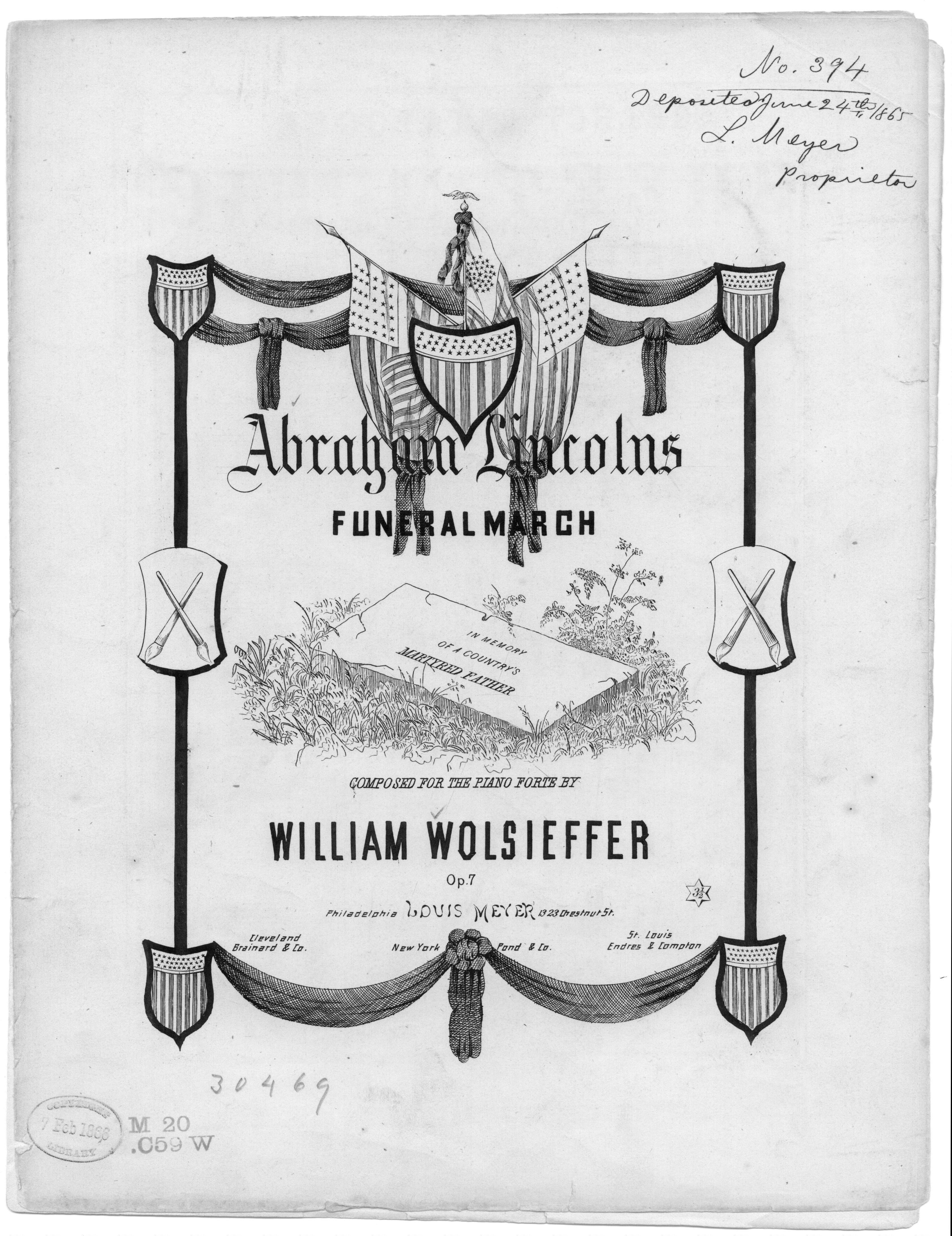
-
Description
Funeral march composed "in memory of a country's martyred father" for solo pianoforte. The work contains two principal thematic subjects and a trio section, and is associated with the Union side.
-
Source
-
Rights
Public Domain. Suggested credit line: Civil War Sheet Music Collection, Library of Congress, Music Division.
-
Creator
Wolfsieffer, William
-
Publisher
Philadelphia: Louis Meyer, 1865
-
Date
May 1, 1865
-
Material
Sheet Music
from May. 1, 1865
Lincoln's funeral march
-
Full Title
Lincoln's funeral march
-
Description
Funeral march composed for solo piano. The composer is associated with the Union side. Davis dedicated to work "to the memory of the pure & noble patriot Abraham Lincoln 16th President of the U.S."
-
Source
-
Rights
Public Domain. Suggested credit line: Civil War Sheet Music Collection, Library of Congress, Music Division.
-
Tags
-
Cite this Item
Davis, E. C.. "Lincoln's funeral march". St. Louis: Balmer & Weber, 1865. Remembering Lincoln. Web. Accessed May 15, 2025. https://rememberinglincoln.fords.org/node/1026
from May. 1, 1865
Lincoln's funeral march

-
Description
Funeral march composed for solo piano. The composer is associated with the Union side. Davis dedicated to work "to the memory of the pure & noble patriot Abraham Lincoln 16th President of the U.S."
-
Source
-
Rights
Public Domain. Suggested credit line: Civil War Sheet Music Collection, Library of Congress, Music Division.
-
Creator
Davis, E. C.
-
Publisher
St. Louis: Balmer & Weber, 1865
-
Date
May 1, 1865
-
Material
Sheet Music
from May. 1, 1865
President Lincoln's funeral march
-
Full Title
President Lincoln's funeral march
-
Description
President Lincoln's funeral march is set for solo piano and consists of a slow introduction, march theme, and trio section. This musical response to President Lincoln's funeral is associated with the Union side. Part of the Library of Congress Civil War Sheet Music Collection.
-
Source
-
Rights
Public Domain. Suggested credit line: Civil War Sheet Music Collection, Library of Congress, Music Division.
-
Tags
-
Cite this Item
Wamelink, J. T.. "President Lincoln's funeral march". Pittsburgh: Wamelink & Barr, 1865. Remembering Lincoln. Web. Accessed May 15, 2025. https://rememberinglincoln.fords.org/node/1024
from May. 1, 1865
President Lincoln's funeral march

-
Description
President Lincoln's funeral march is set for solo piano and consists of a slow introduction, march theme, and trio section. This musical response to President Lincoln's funeral is associated with the Union side. Part of the Library of Congress Civil War Sheet Music Collection.
-
Source
-
Rights
Public Domain. Suggested credit line: Civil War Sheet Music Collection, Library of Congress, Music Division.
-
Creator
Wamelink, J. T.
-
Publisher
Pittsburgh: Wamelink & Barr, 1865
-
Date
May 1, 1865
-
Material
Sheet Music
from May. 1, 1866
Funeral Dirge of President Lincoln
-
Full Title
Funeral Dirge of President Lincoln
-
Description
Funeral dirge composed in honor of Abraham Lincoln's funeral. Composed for solo piano. Part of the Library of Congress Civil War Sheet Music Collection.
-
Source
-
Rights
Public Domain. Suggested credit line: Civil War Sheet Music Collection, Library of Congress, Music Division.
-
Tags
-
Cite this Item
Rynder, Rose. "Funeral Dirge of President Lincoln". Philadelphia: Marsh & Bubna, 1866. Remembering Lincoln. Web. Accessed May 15, 2025. https://rememberinglincoln.fords.org/node/1023
from May. 1, 1866
Funeral Dirge of President Lincoln

-
Description
Funeral dirge composed in honor of Abraham Lincoln's funeral. Composed for solo piano. Part of the Library of Congress Civil War Sheet Music Collection.
-
Source
-
Rights
Public Domain. Suggested credit line: Civil War Sheet Music Collection, Library of Congress, Music Division.
-
Creator
Rynder, Rose
-
Publisher
Philadelphia: Marsh & Bubna, 1866
-
Date
May 1, 1866
